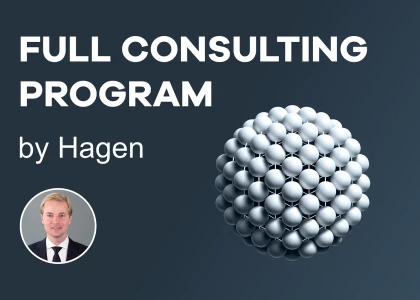For context, I have done 100+ cases, have put in hundreds of hours into my weaknesses (e.g. maths) and have also had a coaching session and my feedback was that I was pretty good
But still, I often can't do cases flawlessly. Especially for maths, I struggle to sometimes structure a question until the end, and ultimately need help to finish it or I take too long. While this can make me pass a first round, I know that recurring mistakes across all interviews will result in a fail
I've also seen most success stories conveying them being near perfect in almost all their cases before the interview, but this isn't the case for me. Must I really have this streak going before I feel ready? How long more will this take?
Why do I never feel ready for an MBB interview ?


Hi there,
I would be happy to share my thoughts on your questions:
- First of all, it’s very normal to feel not ready, even after weeks of preparation. Case study interviews test more than just knowledge - they test pressure handling, stamina, and self-confidence.
- Moreover, however, if you're still struggling with these more basic aspects of a case study interview, it may well be that you're not yet ready for the interviews - and maybe that one coaching session wasn't conducted by an experienced coach and/or your performance was a positive outlier.
- Lastly, I would therefore advise you to consider working with an experienced coach like myself to thoroughly assess and work on your weaknesses.
You can find more on this topic here: How to succeed in the final interview round.
If you would like a more detailed discussion on how to best prepare for your upcoming pre-interview assessments and/or interviews, please don't hesitate to contact me directly.
Best,
Hagen
Totally get where you’re coming from — and you’re not alone. Many strong candidates feel this way, even after 100+ cases.
A few quick thoughts:
- You don’t need to be flawless. MBB interviews aren’t about perfection — they’re about how you think, stay structured, and recover. A stumble in math or structure won’t break you if your overall thinking is solid.
- Most success stories are filtered. People rarely share the cases they messed up days before their offer. Trust your process, not the polished narratives.
- Feeling “not ready” is normal. The real question is: can you perform consistently even when it’s not perfect? That’s what matters.
At High Bridge, we work with a lot of candidates in this exact phase — strong fundamentals, just needing to tighten the final 5%. If you want support or a gut check, we’ve got free resources and bootcamps to help.
You’re likely closer than you think. Keep pushing — you’ve got this.

Thanks for being so open — what you’re feeling is very common, even among successful candidates.
MBB interviews are designed to feel high-pressure and ambiguous, and no one ever feels 100% ready. Even with 100+ cases, it's normal to still make mistakes or feel shaky, especially on math structuring or when timing is tight.
A few things to keep in mind:
- Flawless isn’t the standard — consistency, structured thinking, and coachability matter more than perfection
- Many success stories are shared after the offer — they often skip over the messy parts and doubts that everyone experiences
- Recurring mistakes can be improved with targeted, focused drills, but occasional stumbles won’t automatically disqualify you, especially if you recover well and show strong thinking
You’ve already done the hard work. At this stage, it’s less about doing 20 more cases and more about confidence, presence, and owning your narrative.
You’re likely closer than you think. If you ever want to talk through where you’re at or get perspective on what’s “good enough,” I’m happy to help.

Hello there ! I understand your frustration, and let me tell you that I personally never felt a 100% ready, there is also more you can do to improve :).
That being said, you already know your week points which is great! So instead of doing more and more cases, focus on the math part, bootcamp style. I would recommend only doing the math part of all cases you can find online (it will start making more and more sense the more you do, and you can do many in just a few days), and the second thing is to look at Math section that come with GRE or SATs or similar tests, a lot of the numerical reasoning sections will contain graphs or math questions that can be similar to ones in case studies.
This will enable you to target that muscle specifically, and exponentially improve in your overall case performance. Hope it helps !

Hi there,
It is hard to tell whether you feel "not ready" because you are in a bottle neck to improve further, or you are holding yourself to a very high standard (which we all know consulting industry loves "insecure overachievers", not a bad thing in a sense).
A quick conversation would be the most helpful to know which situation you are - e.g., when you said "While this can make me pass a first round, I know that recurring mistakes across all interviews will result in a fail", is this a feeling or fact-based conclusion?
Feel free to reach out for a free intro call to discuss more. 100+ cases sounds well above-par if we purely talk about the amount of cases. But case preparation has many techniques that some dedicated coaching may be the only way to improve after a certain point.
Best of luck!
Han

Hi there,
First of all — what you’re feeling is completely normal and way more common than most success stories make it sound. Feeling “never ready” for MBB interviews, even after 100+ cases and solid feedback, is actually part of the process for most candidates — especially for people who are self-aware and care about doing well.
One thing that’s important to understand is: there’s no such thing as “flawless” case performance — even for successful candidates. Interviews are designed to test how you think, not how perfectly you execute under practice conditions.
The reality is, even top-performing consultants rarely solve cases 100% smoothly on the job. Interviewers know this, which is why they look more for:
• structured thinking (even if you stumble along the way),
• coachability (how you handle hints and course-corrections),
• resilience under pressure.
As for the math — struggling sometimes or taking longer on certain problems doesn’t disqualify you. What matters more is how you approach the problem and whether you stay calm and methodical. Interviewers care more about your process than about perfect speed.
And regarding the success stories you’ve seen: most people tend to share their peaks, not their messy prep journey. You’re not behind — you’re likely exactly where you should be. Very few candidates walk into interviews with 100% perfect streaks.
When will you feel ready?
Honestly — usually after you’ve done the real interviews. It’s less about hitting perfection in practice, and more about being consistent enough that your floor (even on a bad day) is still “passable.” If your coaches and peers say you’re already good, trust that — and lean into improving small gaps, rather than aiming for perfect.
You’ve done the hard part: the reps, the feedback, the self-awareness. Now it’s just about showing up, being present, and letting the process work. Doubt is normal, but you’re more ready than you think.
If you’d like, I’m happy to help you refine any specific part of your prep! Keep going — you’re close!
Best,
Evelina

Hey!
If I had to guess, no one feels 100% ready for the interviews (even if they say so), as that would also not mimic the real job :p you never know how a client meeting will go and there is so much you can prepare!
This said, I can see a real risk you are "over-preparing". I truly believe there is a tipping point when you start doing more damage than good. This happened to me and the best thing I did was take a breather (which for me looked like not touching anything consulting for 2 weeks, can look different for you also depending on your deadlines). When I came back, I was not "trying too hard" to solve the case, was genuinely more curious about the solutions and was having actual fun with it.
I don't know if you've done any real interviews before or not but my outside-in advice would be to just go for it and start the process. Maybe start with your 2nd preferences to get some practice at a lower bar.
Best of luck!

Hi,
You've already gotten some great advice but I've got two point things to add that helped me:
- Three days leading up: Don't do new cases, just go over the ones you already have - you don't want to find new things to learn and saturate your brain - just go over your notes and literally even do the cases again.
- One day leading up: Just read over your structures and frameworks and chill. get good sleep. eat a good breakfast.
- One hour before: Medidate. Breathe. Your interviewer is just a person. This interview is just a chat. You're cool. You've got this.
Good luck!!

A few options here:
1. Wrong expectations. Case interviews deal with ambiguity. So it is normal and even expectable that candidates may struggle with some of the questions, even if they are prepared.
2. You don't understand what a good approach is. I.e., you are like the tennis non-professional player who did a lot of games but hasn't seen many games, hasn't had any coaching... you know how to do a lot of things, but you also have a lot of blind spots.
You seem to have had feedback from a coach, but did you gain an understanding on what a good approach is? On multiple good approaches to tackle different kinds of problems?
If you are being systematic on how you approach things, you should have a steady performance at this point. If you don't have a systematic approach, then you will have to take a step back and learn how to do it.

It's perfectly normal not to feel ready.
It's also perfectly normal to make mistakes in your interview and pass.
I made mistakes and I passed.
My candidates make mistakes and pass.
I have not yet heard of anybody performing flawlessly by their own assessment or the assessment of the interviewer.
The feeling that I would recommend you go for is that you've done the best that you could, that you've reached the best level that you feel you could reach at the moment. Meaning, giving yourself more weeks of practice is only likely to lead to exhaustion and a decrease in your energy and motivation.
Of course, it depends also what was the feedback from the coaching session that you've had since that would be the only expert input that you could rely on.
Best,
Cristian

Two reflections here:
- You’ll never feel 100% ready—even after joining. That’s imposter syndrome. The key is to be ready enough to handle any situation in the interview with logic, confidence, and structure.
- At some point, it’s not about doing more cases or drills. It’s about working with someone who can pinpoint exactly what’s not working and help you improve it.
Happy to have a conversation about it—just drop me a message.
Best,
Alberto
—
Explore my latest case inspired by a real MBB interview: Sierra Sprints - New Product Launch

Hi,
I understand it's hard to keep on preparing and working on your main points of improvement (like math). The entire recruitment process and interviews are also a mental game. You need to believe your are the best candidate for the job; and share that confident during the interview.
That being said, math is the most difficult part for a lot of candidates. I recommend practicing quick math drills for 15m on a daily basis.
Feel free to schedule a free intro call to see how I can give you tips on the math part.
Mattijs

Hey there,
This is a very common problem!
The key reason why candidates fail their case interviews and don't improve with practice is because they never learn the right approach and techniques to begin with. They might go through 30-40 cases, just repeating the same mistakes over and over again. There is often no strong baseline or foundation.
Make sure you understand and learn the basics for each part of the case (structuring, charts, math), which is
A replicable step-by-step for each part of the case interview
The right thinking techniques around the individual parts (e.g., what's a framework, what is evaluated, how can I ensure I think about it the correct way, what are some shortcuts to get to the answer quickly, etc.)
Simple communication templates to help you communicate your insights as well as ask for data in the right way to drive the case forward
- There are several approaches you can take, such as hiring a skilled coach, reading the right materials, or enrolling in relevant courses. For example, my book provides direct guidance tailored to modern case interviews. It covers all the essential points mentioned here, and more, while also offering a detailed preparation plan. You can find it on Amazon
Avoid generic advice and framework memorization approaches. This will only hurt your performance and waste a ton of time (why -> check out the first post here: https://www.preplounge.com/en/consulting-forum/how-goodrelevant-is-the-case-in-point-book-for-case-prep-1984)
Once you have that baseline it's time to practice and internalize the skills to create the right profile, polishing your strengths and lifting your weaknesses to a robust-enough level
- Practice drills alone (structure, chart, math) and practice full cases with other excellent candidates that know the right habits and approach. It is crucial that you are practicing with really good peers, otherwise, it's a waste of time. Practicing drills on your own is a huge effectivity and efficiency booster since you can go over many more questions in a shorter amount of time compared to practicing with peers. Do both in parallel! You want to spend your time where it is most useful, e.g., if you struggle with math focus on math drills, etc.
Focus on quality over quantity. Doing 50+ cases does not mean much if you are not applying the right habits to score high and do a detailed debrief after every case to improve. You want to move from bad to good for your weaknesses and good to great for your strengths --> use the feedback from your previous experience and tailor your prep accordingly
Consider booking at least an initial coaching session to get a detailed and objective evaluation of your performance + learn the right habits for every case regardless of context and framework + get a tailored preparation plan out of the session that will set you up for an effective and efficient prep.
- Don't forget the fit interview part. Prepare answers for all the typical fit questions and stories (3-5 hours) and rehearse them a couple of times (5 hours)
All the best,
Florian

Hello there!
First of all, you can overcome this problem, rest assured. Every candidate has a different challenge when it comes to case interview, your situation is totally normal.
It seems your main problem is with the math structure. If that is the root cause of your problem, let me give some additional points to the ones mentioned:
1. Make sure your math method is clear and that you repeat it in every case. What I usually advise: (1) confirm the understanding of the prompt to make sure you’ll calculate the correct thing. (2) confirm the data that was given to you, so you’re not missing anything. (3) structure your equation in a bottom up approach. E.g.: if you need to find profitability, you need to find costs and revenues. If you need to find revenues, you need volume * price. If you need to find volume, you’ll need market * pen rate (just to illustrate), etc. (4) confirm the logic with your interviewer using variables only - DO NOT PLUG THE NUMBERS yet, as this will only make it confusing when explaining and to sanity check. (5) after confirming the logic, plug the numbers and do the math. (6) Interpret the number by comparing to a proxy, a given number, a goal, etc (depending on the case) and see how it impacts the case objective. (7) State that to the interviewer. (8) in face of the insights, propose the next steps.
2. Redo math from cases you already did without putting the time pressure. If you’re still making mistakes, you should aim for accuracy, not speed. As you get more and more accuracy, you may put back the time pressure in your practices. If you do this every day tackling 5 math exercises, you’ll probably improve a lot in one week or so, and will be able to time yourself again - just to give you an idea.
3. Make a log of your cases to see both what you’re still doing wrong, as what you’re doing right. More often then not, we overestimate our gaps and get blind about our improvements. That will give you more confidence and motivation to keep going.
4. Not sure if this is your case, but if you feel nervous before math exercises, I suggest you some psychological exercises such as tapping (EFT), positive self talk and meditation/visualization before your cases. Before the math part itself, take some deep breaths to center yourself.
If you would like professional help from someone who has overcame a similar issue to yours, I would be very happy to support you! Feel free to connect, I offer a 20min free consultation that we can use to deep dive into this current situation and see if coaching is really what you need.
Best,
Mari

Honestly, not feeling ready is pretty common — and it usually means you’re actually getting close. You’ve done 100+ cases, worked on your weak spots, got good feedback… you’re not behind, you’re just seeing the bar more clearly now. That’s a good thing.
The idea that people are “perfect” before MBB interviews is kind of a myth. Most candidates have shaky cases even late in prep. What matters is whether you can stay composed, think clearly, and bounce back when something doesn’t go as planned — not nailing every question start to finish.
At this point, it’s less about more prep and more about trusting your prep.

Hey there,
It sounds like you’re putting in an impressive amount of work! The fact that you’ve already done 100+ cases and worked on your weaknesses shows real dedication, which is great. However, it’s totally normal to not feel 100% ready — MBB interviews are incredibly tough and are designed to push you. The feeling of "not ready" is actually quite common, even for those who have practiced extensively.
Here’s the thing: perfecting every case is less important than getting comfortable with the process and demonstrating your problem-solving skills under pressure. No one is perfect, and those who share success stories have often learned from their own mistakes. The key is to be consistent and progressively better with each case, even if you still make occasional errors. Remember, it’s about showing improvement and problem-solving ability, not perfection.
If you continue practicing with a focus on getting faster with structured approaches and improving your comfort with math, you'll get closer to being ready. Focus on progress, not perfection. And remember, it’s okay to struggle — it's part of the learning process.
If you ever want to chat more or do more mock cases, feel free to reach out!
Best regards,
Alessa

Sometimes less is more. You may be putting too much pressure on yourself and over-taxing yourself in the process. I've found mental game coaches to be highly useful in addition to coaching for specific feedback to build confidence for higher performance (e.g., breathing, positive self-talk, etc.). Ultimately I've found the case interview selection process to not entirely hinge on whether you get perfect maths, but rather how you bounce back from challenging situations and move forward as a collaborative professional who could be on a case team.














